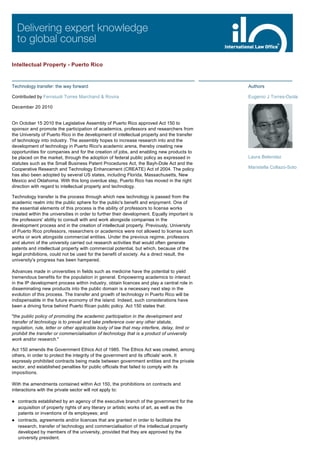
Technology Transfer
- 1. Intellectual Property - Puerto Rico Technology transfer: the way forward Authors Contributed by Ferraiuoli Torres Marchand & Rovira Eugenio J Torres-Oyola December 20 2010 On October 15 2010 the Legislative Assembly of Puerto Rico approved Act 150 to sponsor and promote the participation of academics, professors and researchers from the University of Puerto Rico in the development of intellectual property and the transfer of technology into industry. The assembly hopes to increase research into and the development of technology in Puerto Rico's academic arena, thereby creating new opportunities for companies and for the creation of jobs, and enabling new products to be placed on the market, through the adoption of federal public policy as expressed in Laura Belendez statutes such as the Small Business Patent Procedures Act, the Bayh-Dole Act and the Cooperative Research and Technology Enhancement (CREATE) Act of 2004. The policy Maristella Collazo-Soto has also been adopted by several US states, including Florida, Massachusetts, New Mexico and Oklahoma. With this long overdue step, Puerto Rico has moved in the right direction with regard to intellectual property and technology. Technology transfer is the process through which new technology is passed from the academic realm into the public sphere for the public's benefit and enjoyment. One of the essential elements of this process is the ability of professors to license works created within the universities in order to further their development. Equally important is the professors' ability to consult with and work alongside companies in the development process and in the creation of intellectual property. Previously, University of Puerto Rico professors, researchers or academics were not allowed to license such works or work alongside commercial entities. Under the previous regime, professors and alumni of the university carried out research activities that would often generate patents and intellectual property with commercial potential, but which, because of the legal prohibitions, could not be used for the benefit of society. As a direct result, the university's progress has been hampered. Advances made in universities in fields such as medicine have the potential to yield tremendous benefits for the population in general. Empowering academics to interact in the IP development process within industry, obtain licences and play a central role in disseminating new products into the public domain is a necessary next step in the evolution of this process. The transfer and growth of technology in Puerto Rico will be indispensable in the future economy of the island. Indeed, such considerations have been a driving force behind Puerto Rican public policy. Act 150 states that: "the public policy of promoting the academic participation in the development and transfer of technology is to prevail and take preference over any other statute, regulation, rule, letter or other applicable body of law that may interfere, delay, limit or prohibit the transfer or commercialisation of technology that is a product of university work and/or research." Act 150 amends the Government Ethics Act of 1985. The Ethics Act was created, among others, in order to protect the integrity of the government and its officials' work. It expressly prohibited contracts being made between government entities and the private sector, and established penalties for public officials that failed to comply with its impositions. With the amendments contained within Act 150, the prohibitions on contracts and interactions with the private sector will not apply to: l contracts established by an agency of the executive branch of the government for the acquisition of property rights of any literary or artistic works of art, as well as the patents or inventions of its employees; and l contracts, agreements and/or licences that are granted in order to facilitate the research, transfer of technology and commercialisation of the intellectual property developed by members of the university, provided that they are approved by the university president.
- 2. However, to ensure that proper supervision of the activities comprising public employees is still enforced, the president will have 90 days after the end of each fiscal year to submit a report to the Office of Governmental Ethics of all transactions approved pursuant to Act 150 during the year. Act 150 also requires that the university establish a regulation describing the public policy behind this initiative. The regulation must also include the guidelines that must be complied with in order for the contracts and negotiations allowed under Act 150 to be valid and enforceable. Finally, the regulation must be prepared with and approved by the executive director of the Trust for the Sciences, Technology and Research of Puerto Rico. Puerto Rico's legal structure and public policy relating to the advancement of research and the development of technology is finally looking to the future. For further information on this topic please contact Eugenio J Torres-Oyola, Laura Belendez or Maristella Collazo at Ferraiuoli Torres Marchand & Rovira by telephone (+78 7766 7000), fax (+78 7766 7001) or email (etorres@ftmrlaw.com, lbelendez@ftmrlaw.com, or mcollazo@ftmrlaw.com). The materials contained on this website are for general information purposes only and are subject to the disclaimer. ILO is a premium online legal update service for major companies and law firms worldwide. In- house corporate counsel and other users of legal services, as well as law firm partners, qualify for a free subscription. Register at www.iloinfo.com. Online Media Partners © Copyright 1997-2010 Globe Business Publishing Ltd